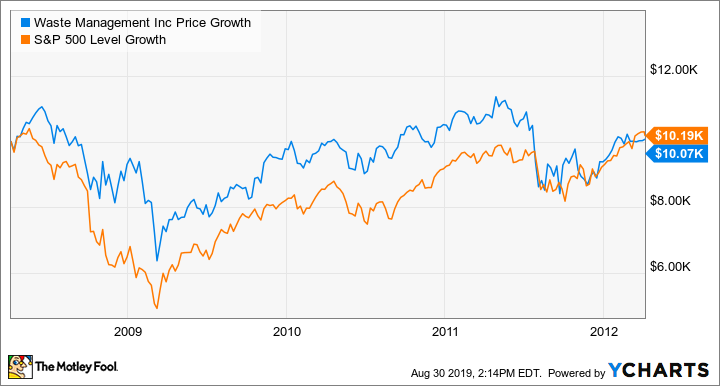Waste Management (WM 1.08%) has kept investors happy in recent years. The trash services provider's shares have climbed over 150% in the last five years and have quadrupled over the last 10, powered by a robust dividend and a strong market share – not to mention a historically strong bull market. But will the company be able to maintain this performance in a market downturn? Although recessions pose a challenge for all companies, Waste Management's industry, competitive positioning, and growing dividend positions the company to outperform the market during a recession.

Image Source: Getty Images
Trash services industry
Historically, the trash service industry has been a stable and resilient. Two key reasons for this stability are the oligopoly characteristics of the trash services market and trash removal's positioning as a necessary service.
The trash industry in the United States operates as an oligopoly, with only a few main competitors dominating the market. Industries that experience oligopoly competition tend to be recession-resilient because the reduced competition in these industries allow businesses more freedom to raise prices without losing market share. Trash services operates as an oligopoly primarily because of high barriers to entry due to extensive regulation surrounding landfill construction and maintenance, which makes it difficult and expensive for new landfills to be built. As a result, trash services providers are positioned to be able to control prices during an economic downturn.
Industries that provide necessary services are also often recession resistant because people cannot reduce their consumption in response to economic events. Trash services checks that box perfectly. Are you going to let trash pile up in your house when the economy slows? This trait, combined with the oligopoly nature of the industry, allows trash services providers to maintain revenues during downturns and, if necessary, increase prices.
Waste Management: The king of trash
Waste Management is the industry leader in trash services. In the two crucial segments in the trash services industry, collection and landfill, Waste Management enjoys a market share of 30% and 47% respectively. This compares favorably to its main competitor, Republic Services (RSG 0.82%), who enjoys market share in collection and landfill of 24% and 17%, respectively.
Waste Management's fleet includes nearly 26,000 collection and transfer vehicles, making it the largest trucking fleet in the waste industry.
Waste Management also holds an advantage in landfills, owning over 100 more than Republic Services. Owning the most landfills is a huge competitive advantage because regulation and permits around building new landfills have increased so much that it is extremely difficult to build new ones.

Data Source: Waste Management
Waste Management's performance during the Great Recession
Waste Management performance during the great recession is the last key reason to invest in it for the coming downturn. \Waste Management did feel the effects of the great recession but was able to return to pre-recession stock levels by April of 2011. Compare this to the S&P 500, which took until March 2012 to return to pre-market levels.
Although margins dipped slightly from 2010 to 2012, Waste Management was able to maintain profitability and relatively stable free cash flows After returning to pre-recession levels, Waste Management also started to pay a dividend in 2011 and has increased that dividend by 44% since.

Data source: Waste Management, Chart created by author
A dividend-yielding stock is a great thing to have in a recession because the dividend yield can provide a stable rate of return as stock prices fluctuate. However, as an investor, you need to know if the dividend is affordable for the company so it can continue to pay a dividend even when revenue and profits begin to decrease. One way of determining the affordability of a dividend is by analyzing the dividend payout ratio, which measures the fraction of net income that a company pays out to shareholders as dividends. Waste Management has a 42% dividend payout ratio. This means that for every dollar of net income, Waste Management still has 58 cents left to reinvest in the business after paying its dividend. As a result, Waste Management appears well-positioned to maintain its dividend, even if a recession were to significantly reduce its earnings.
Trash services is a strong recession resilient industry, and Waste Management is the largest and most competitively positioned trash service provider. With Waste Management's competitive dominance, coupled with its steady and affordable dividend yield, it is the perfect recession-proof stock to invest in.






